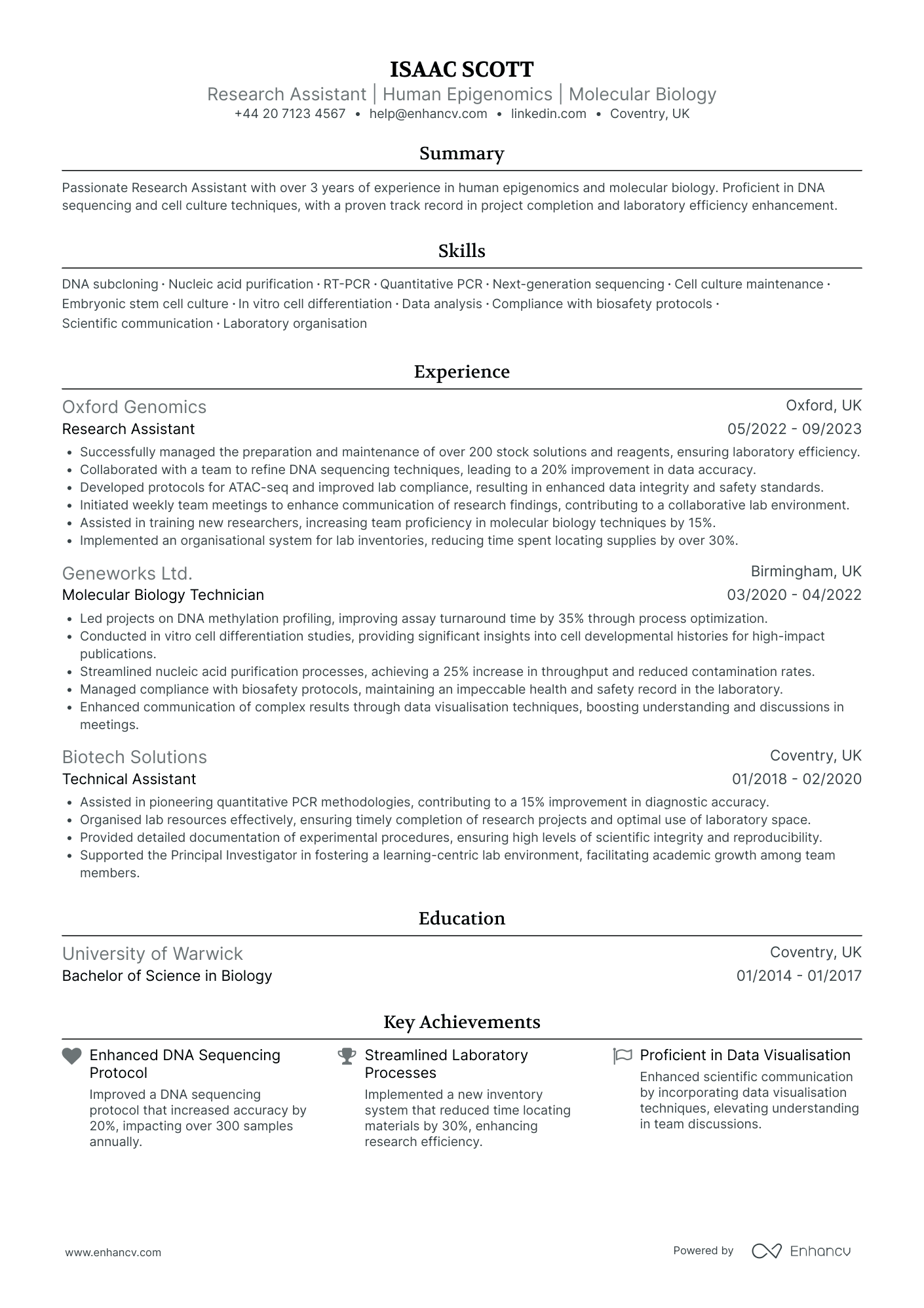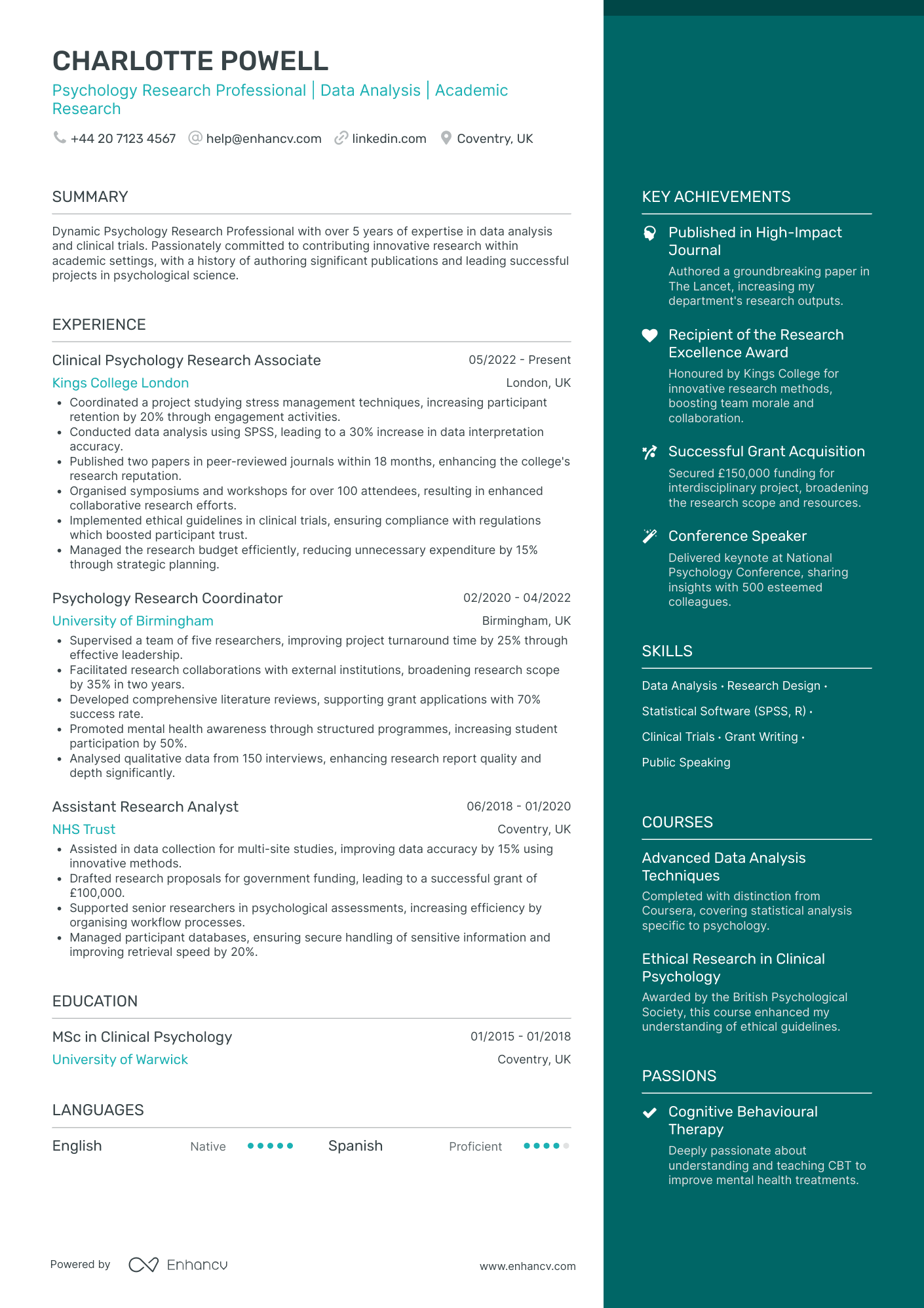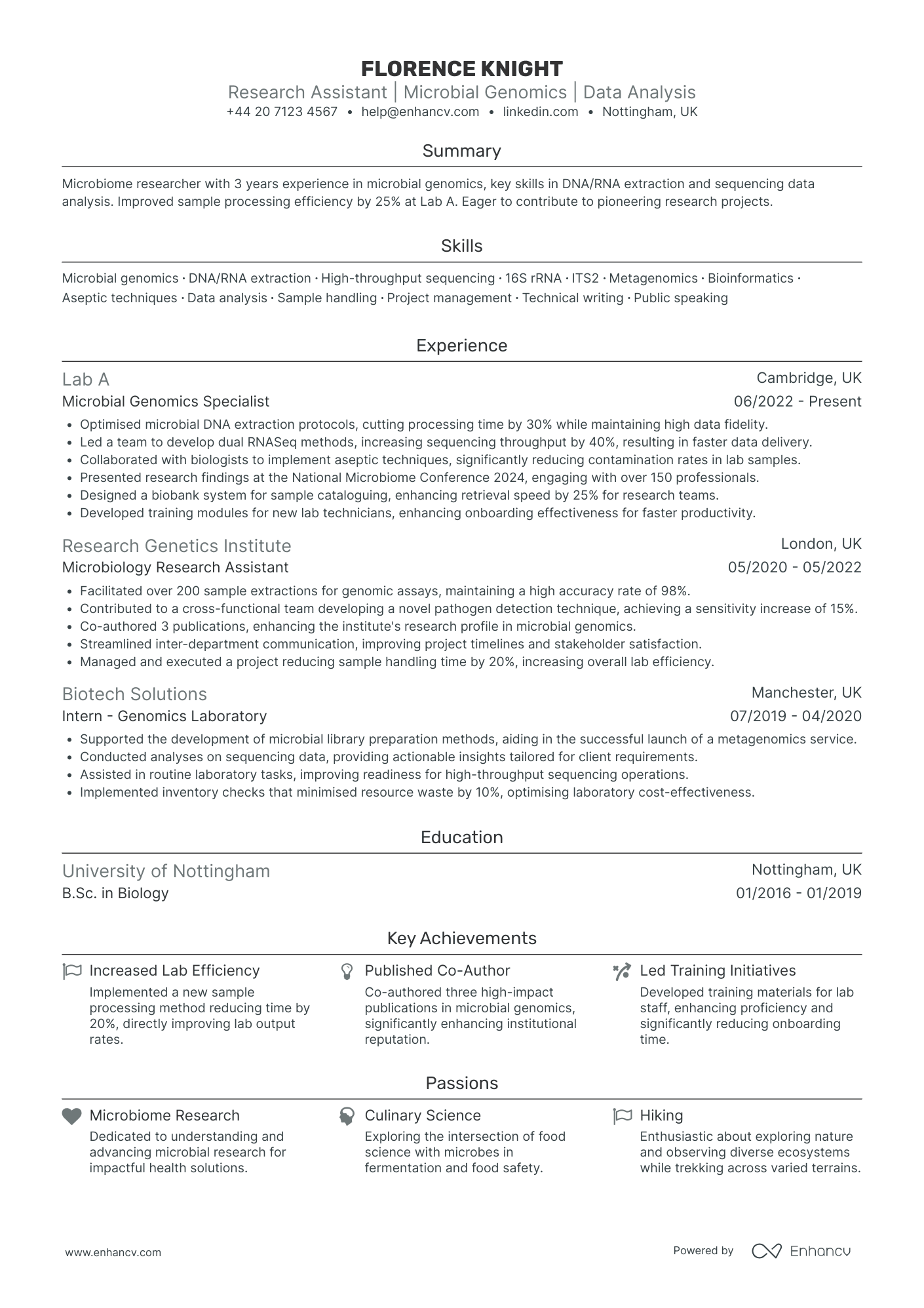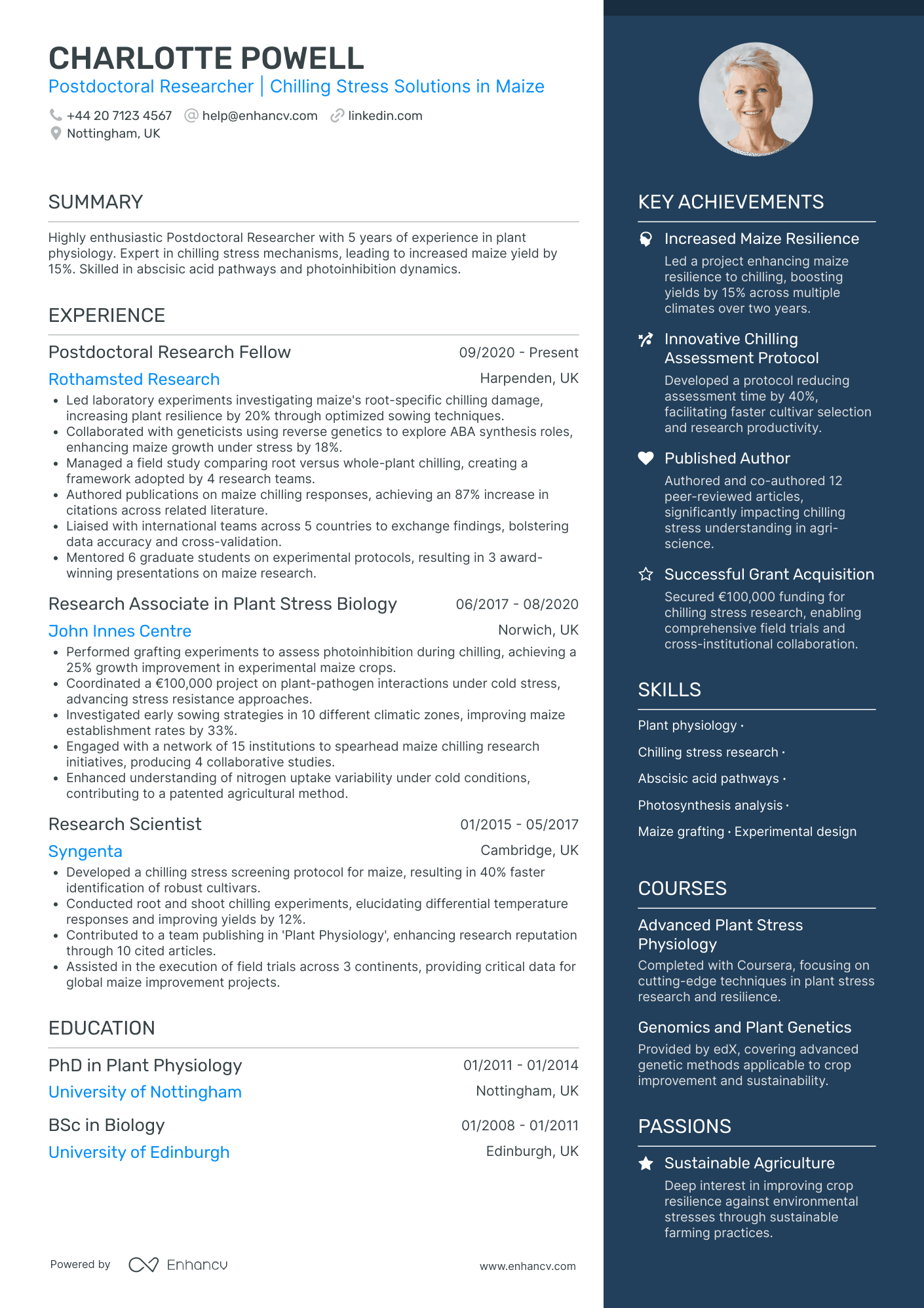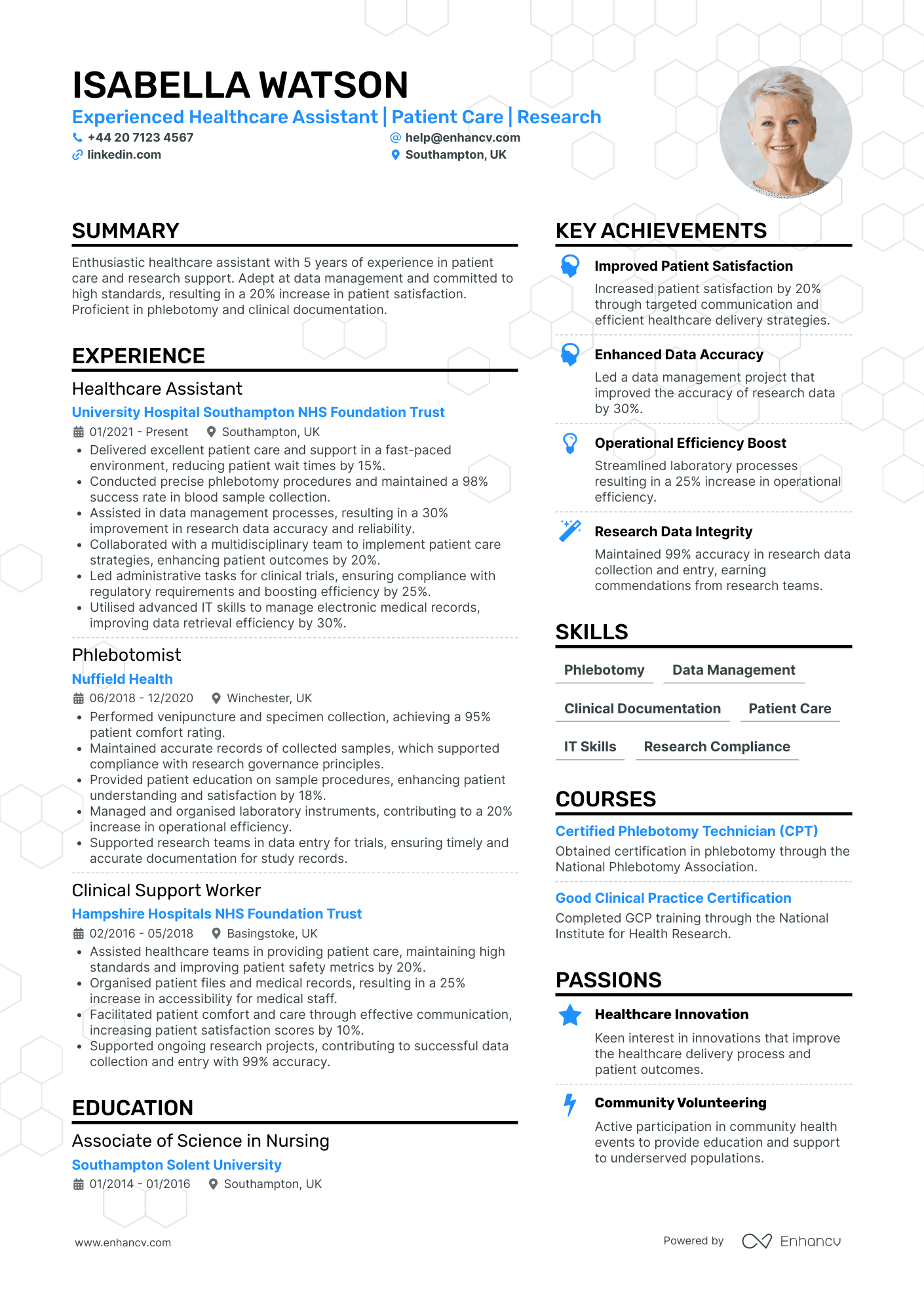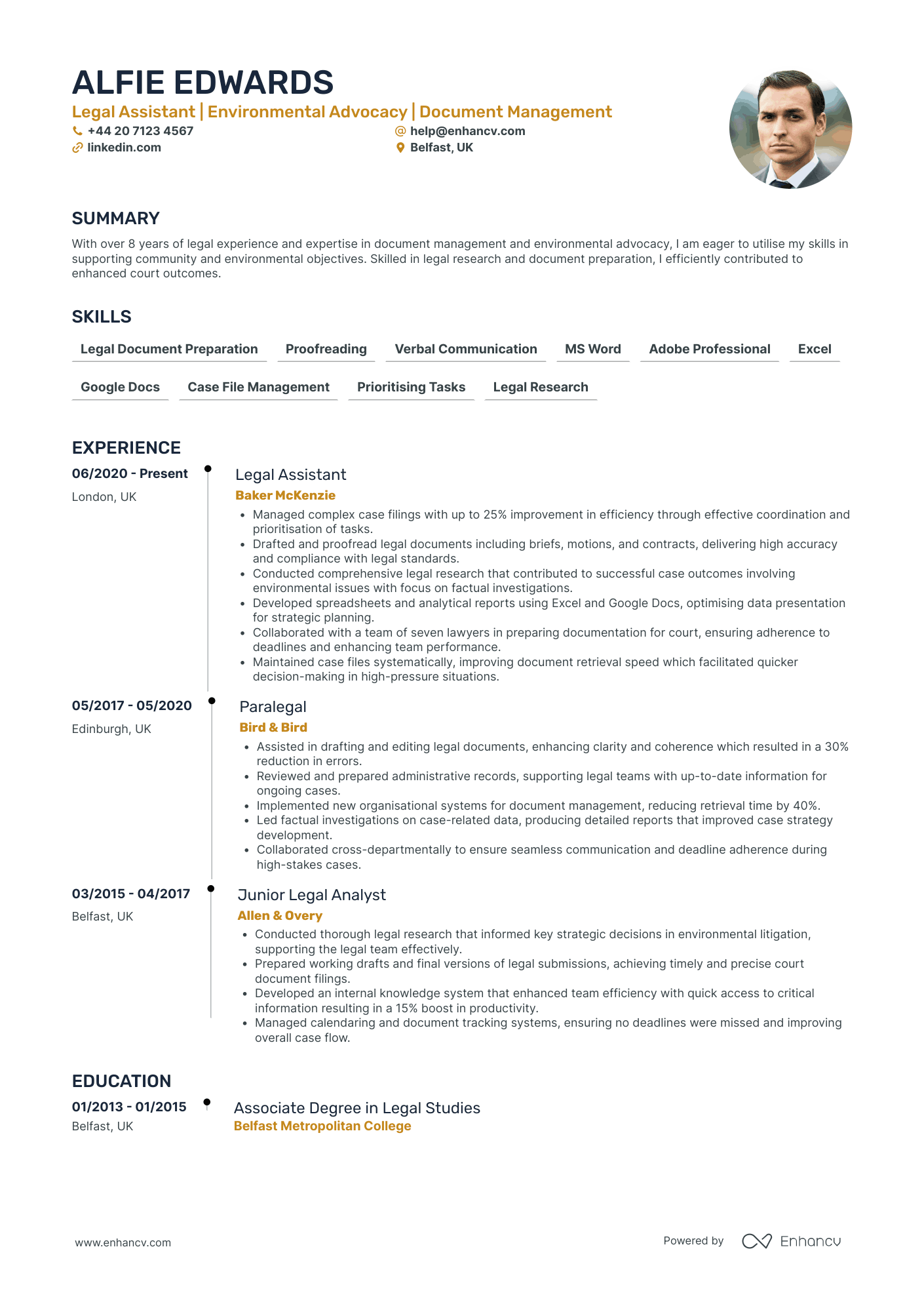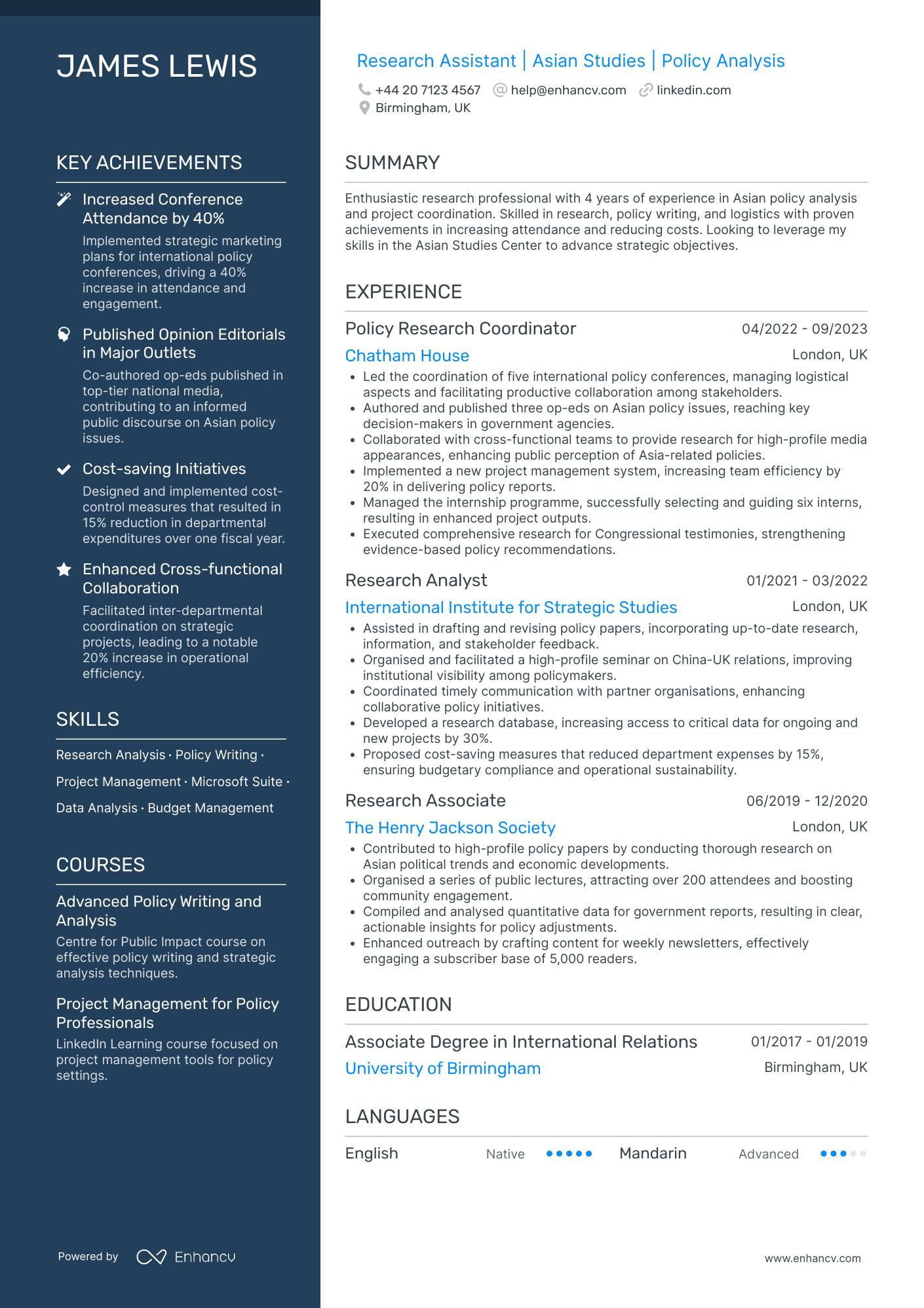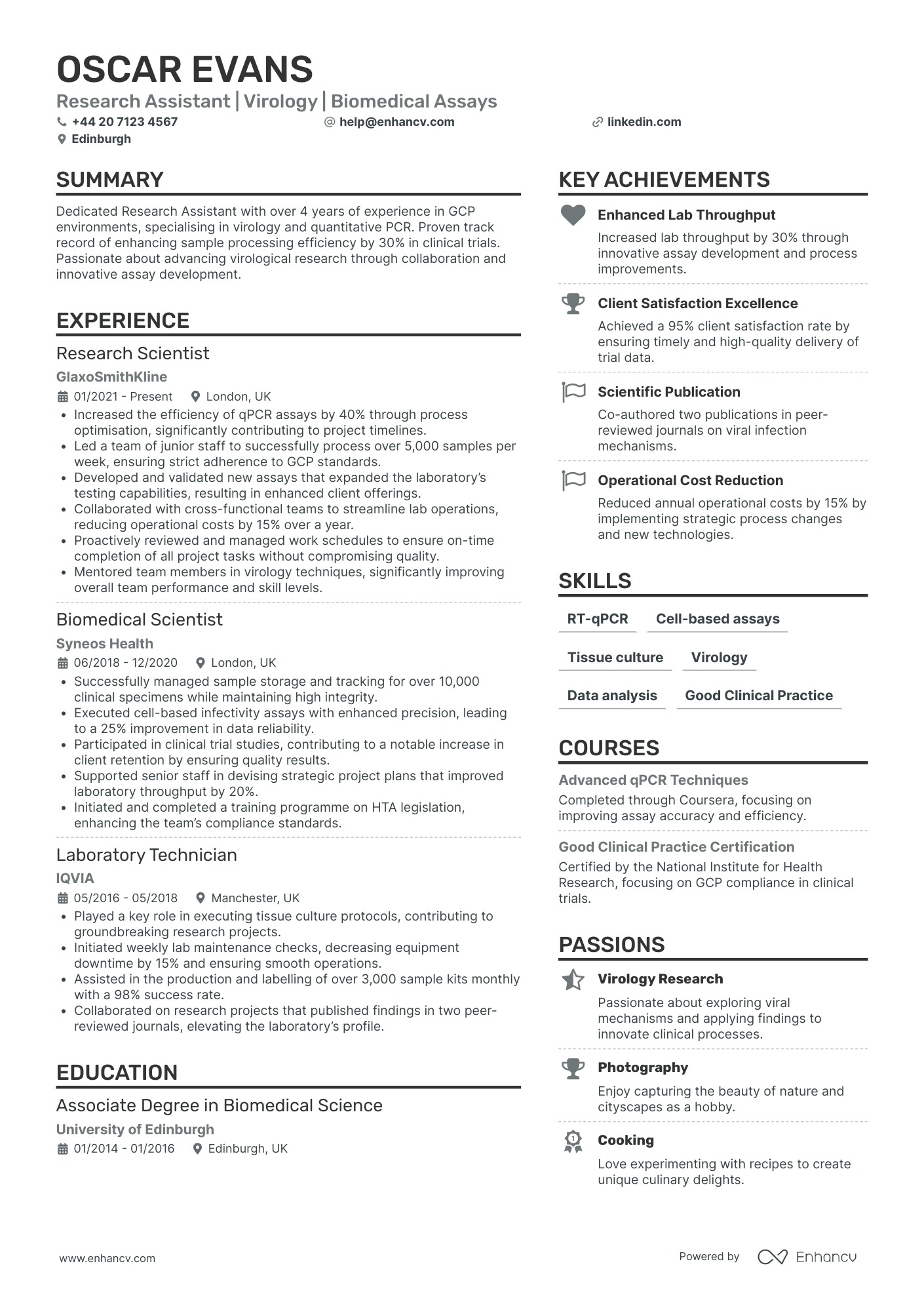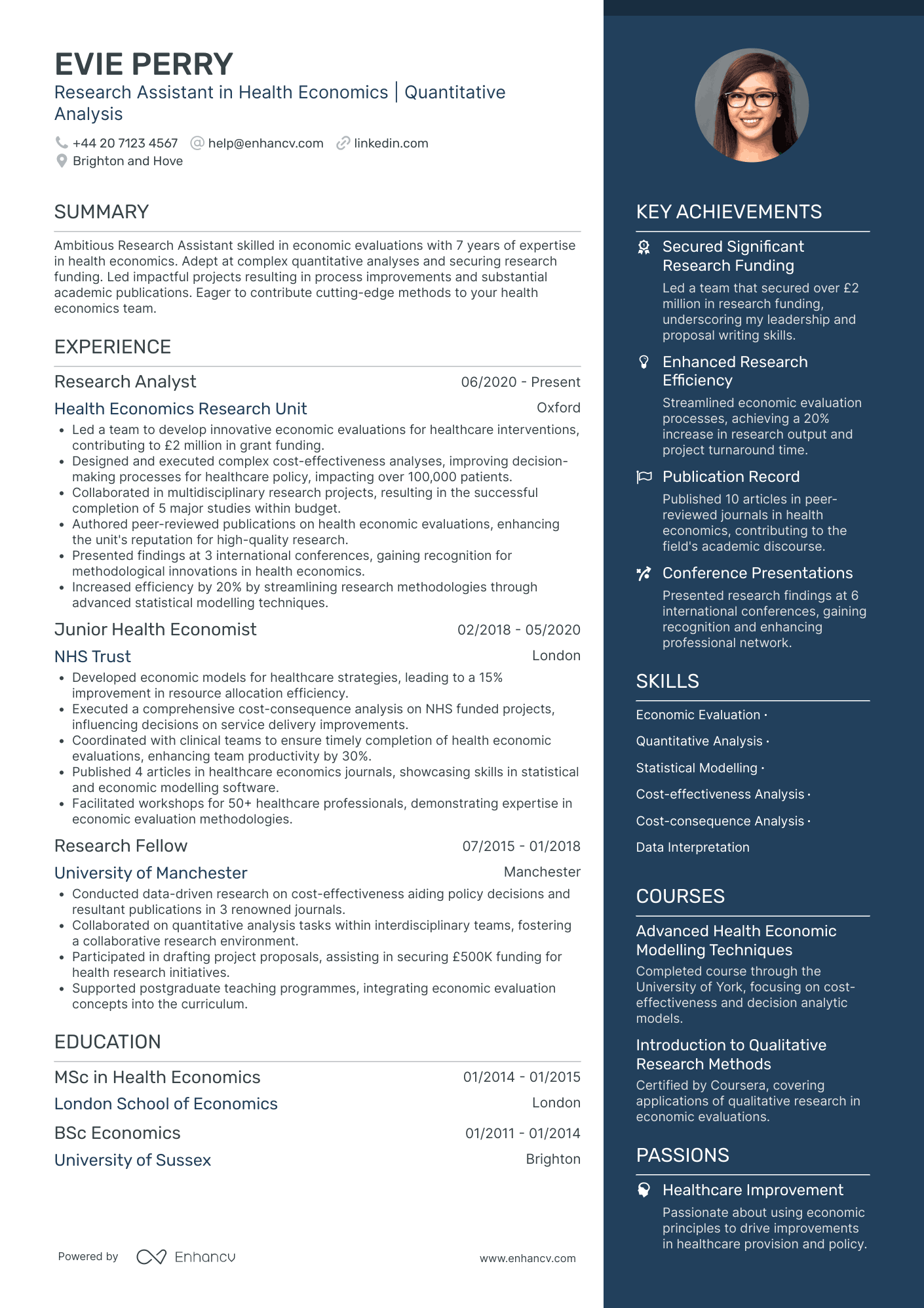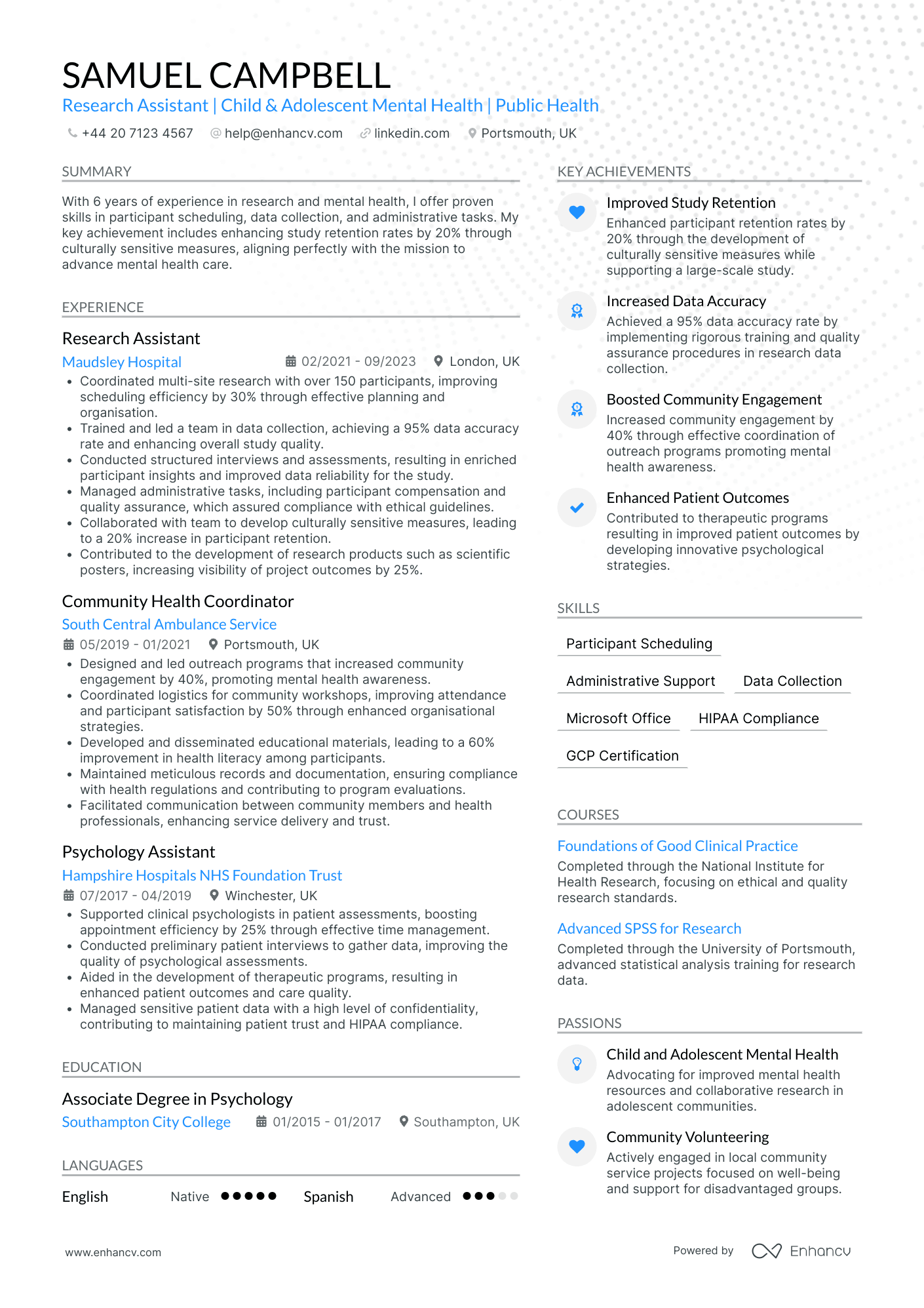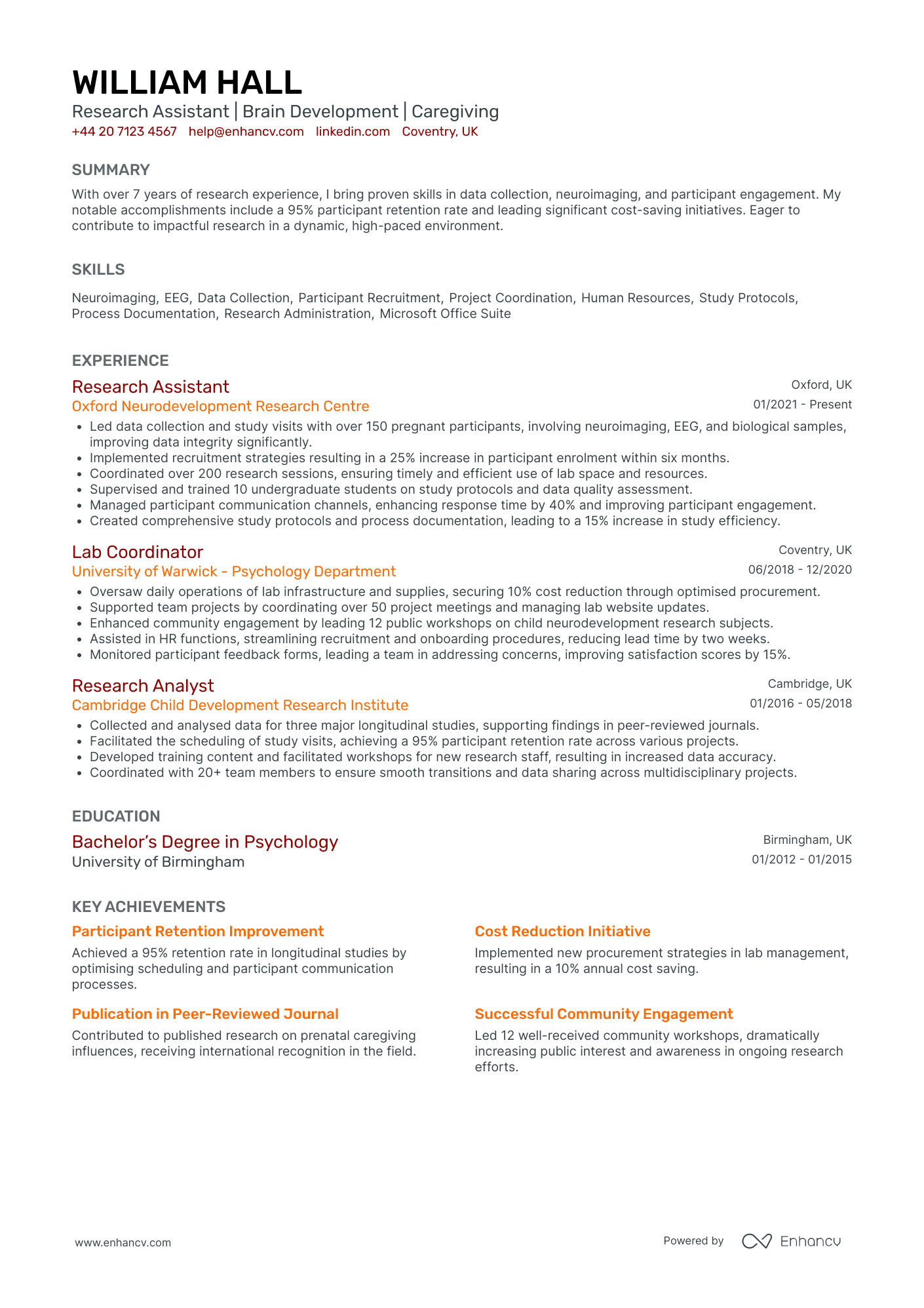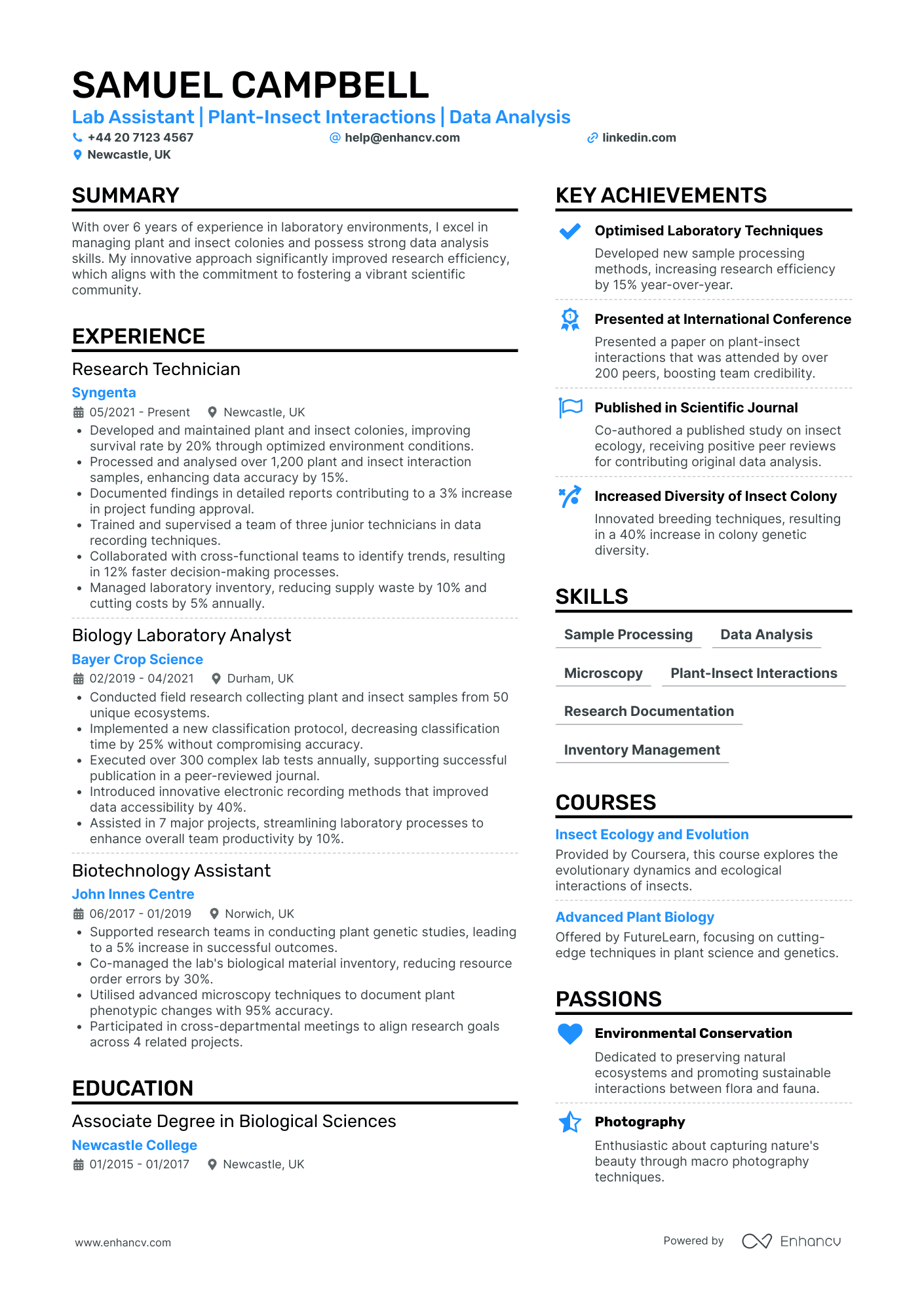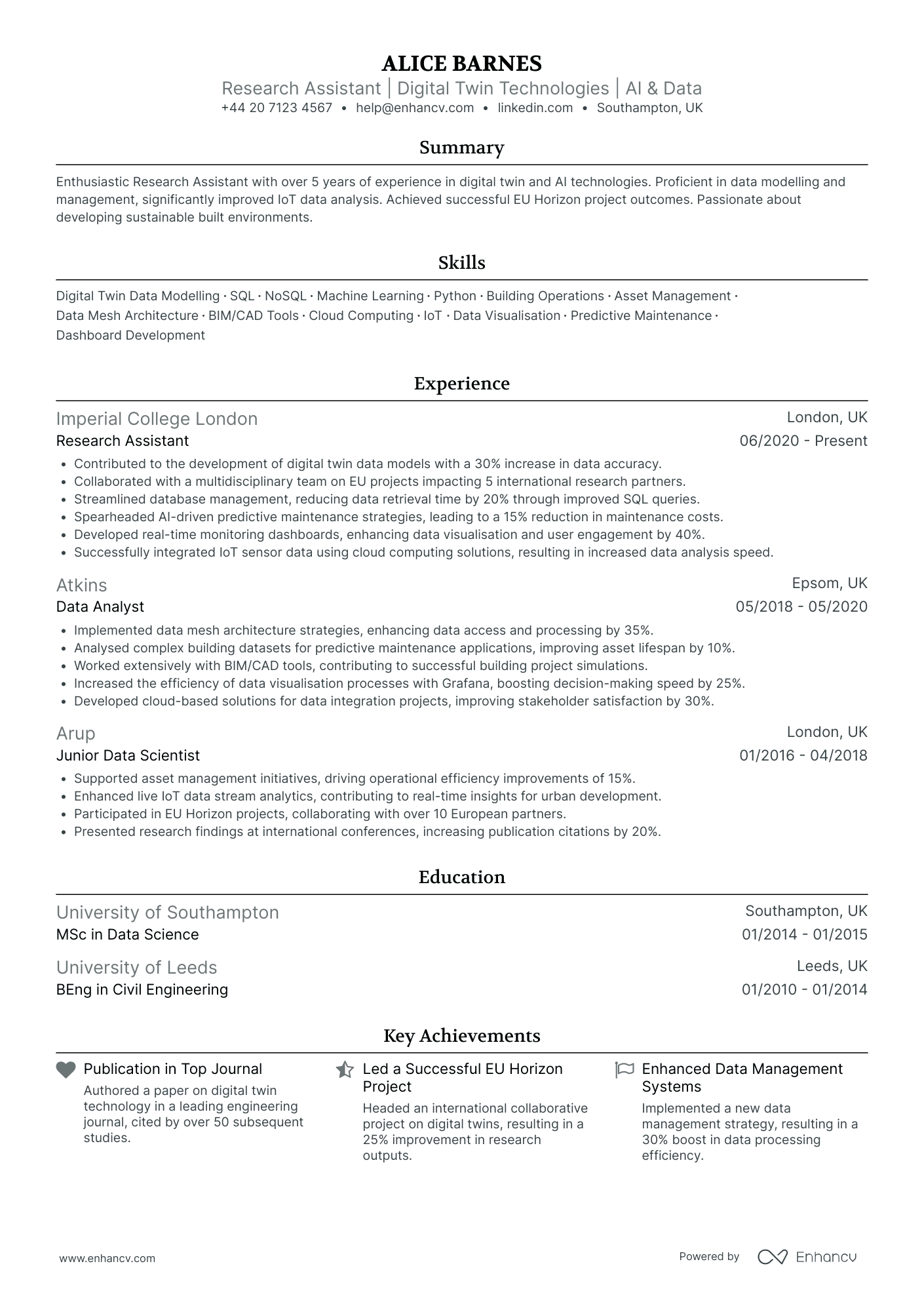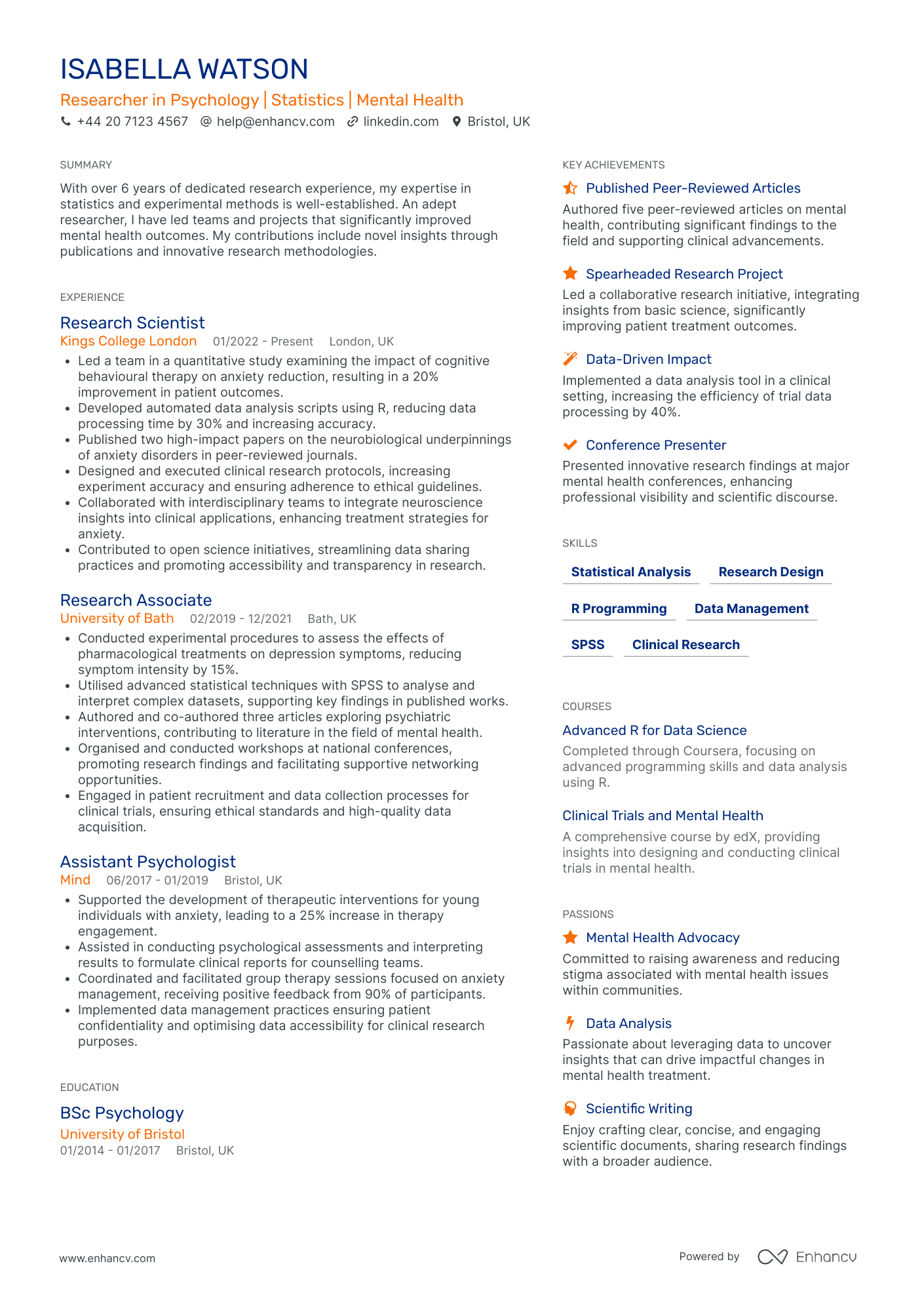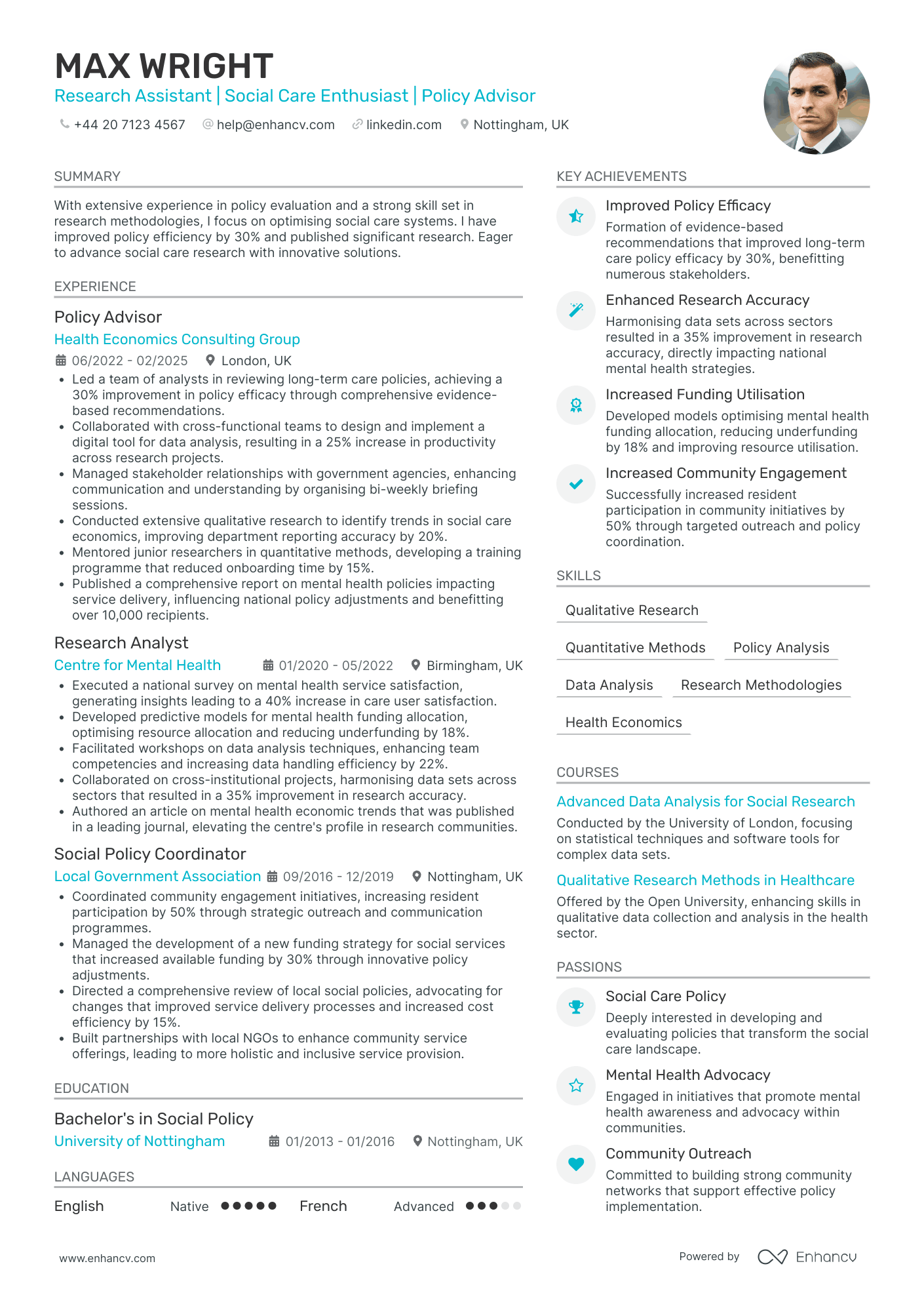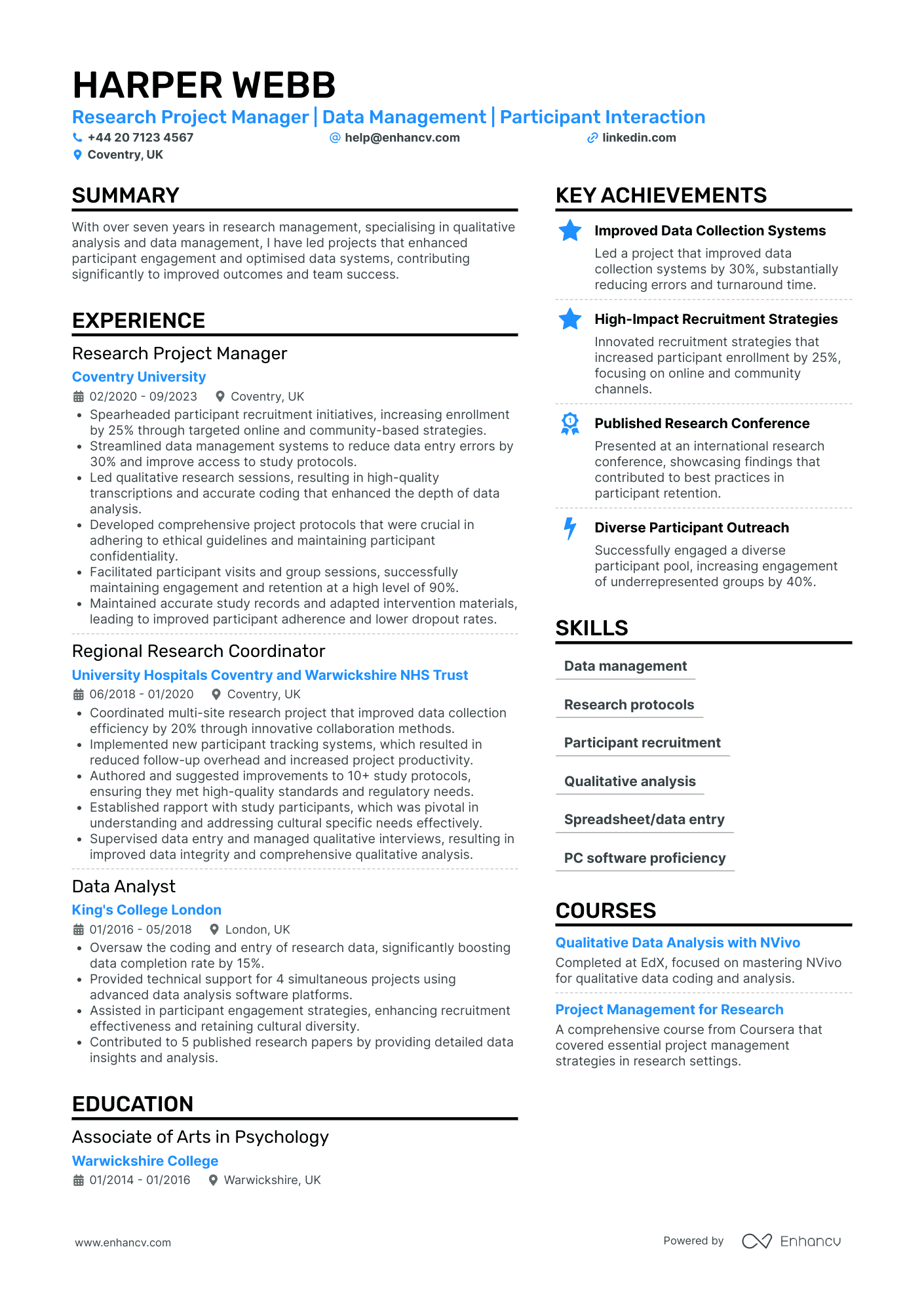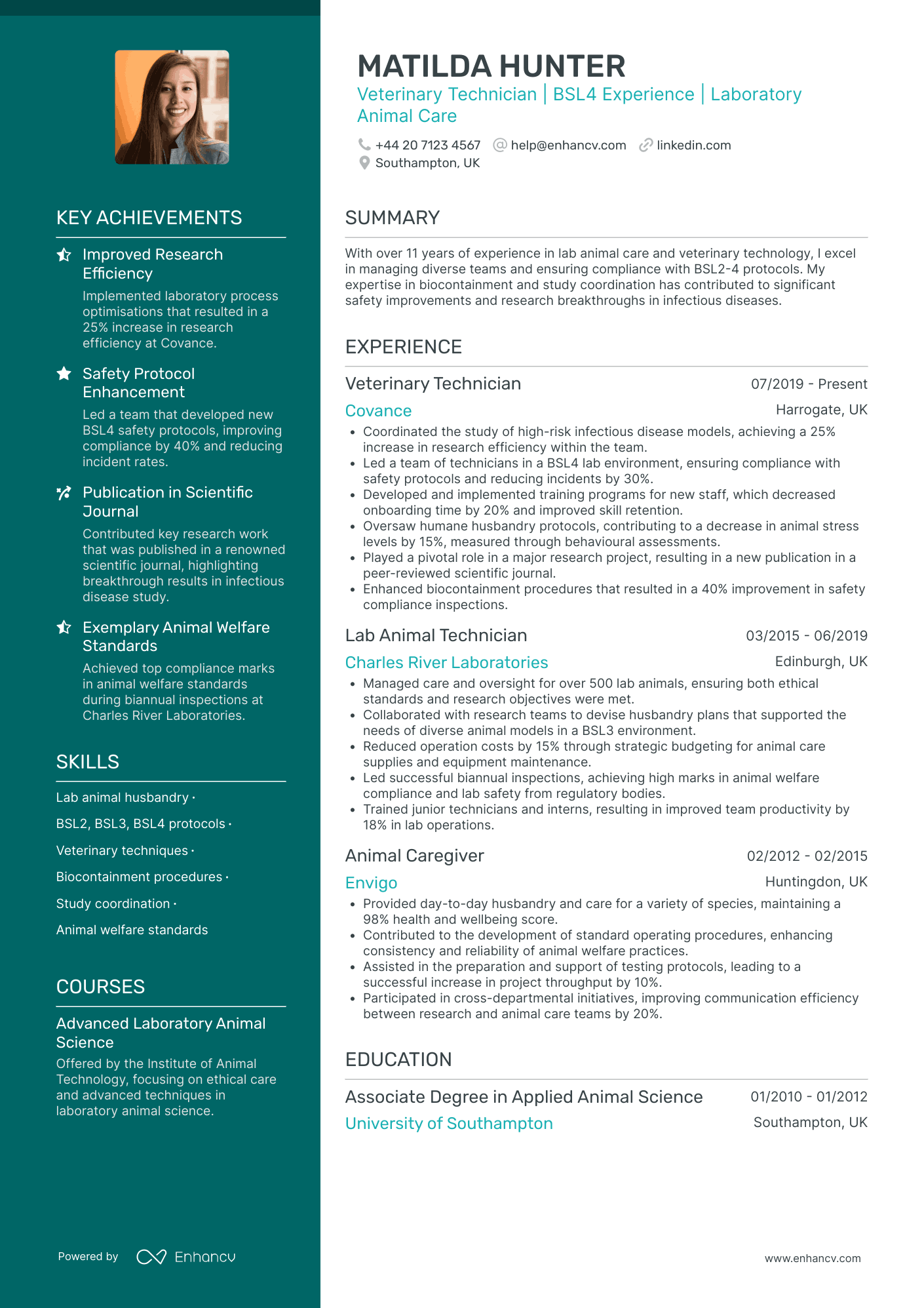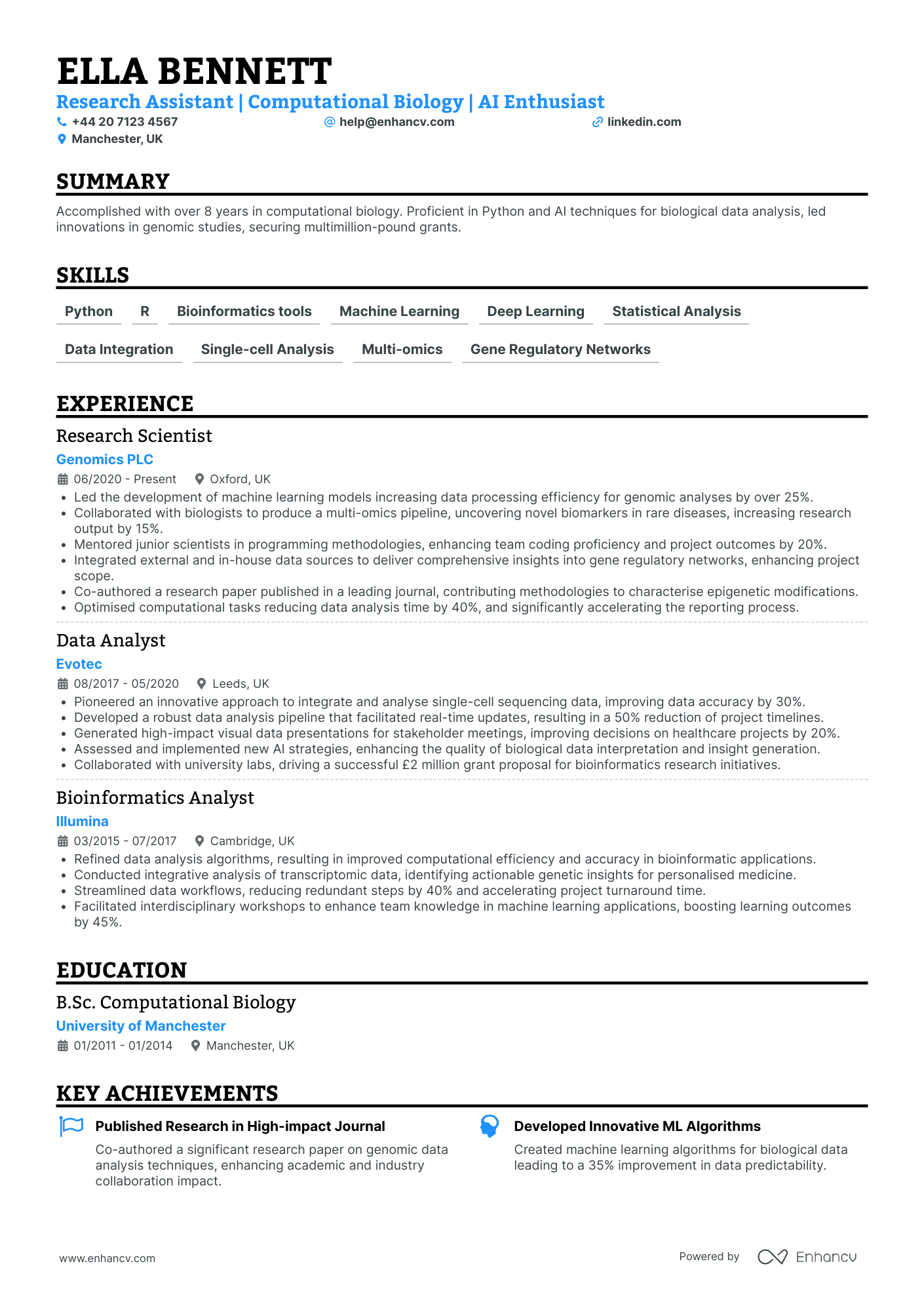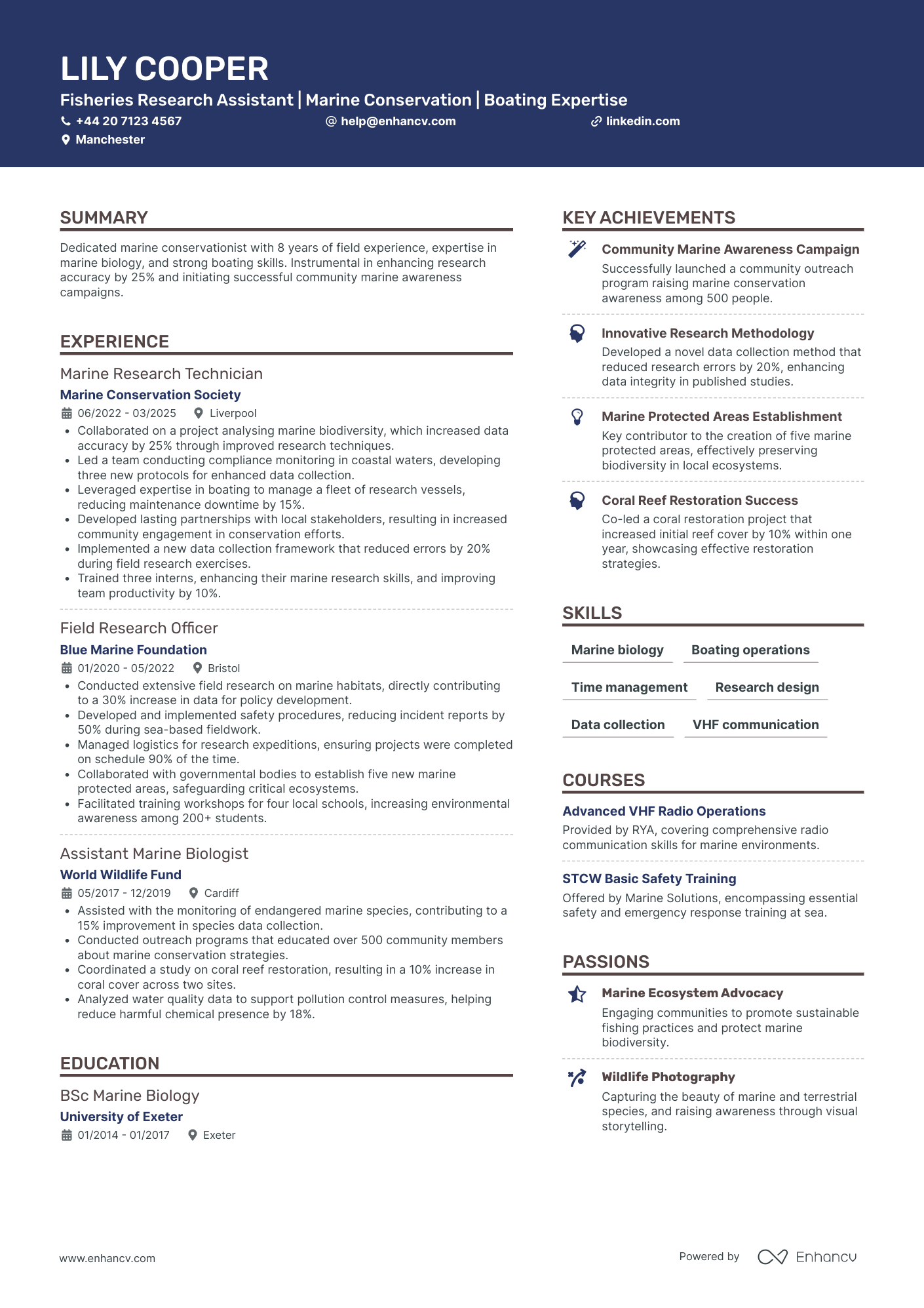Crafting a CV that adequately showcases your diverse skill set and research experience can be a daunting challenge for a research assistant. Our guide provides tailored advice and practical examples to help you effectively highlight your academic achievements and research expertise, ensuring your CV stands out to potential employers.
- Answer job requirements with your research assistant CV and experience;
- Curate your academic background and certificates, following industry-leading CV examples;
- Select from +10 niche skills to match the ideal candidate profile
- Write a more succinct experience section that consists of all the right details.
Do you need more specific insights into writing your research assistant CV? Our guides focus on unique insights for each individual role:
Resume examples for research assistant
By Experience
Senior Research Assistant in Biochemistry
- Career Development with Diverse Responsibilities - Isaac Scott's CV illustrates a progressive career path spanning from a Technical Assistant to a Research Assistant, showcasing a clear growth trajectory. His role expansions within molecular biology environments illustrate significant advancements in responsibilities, from assisting in developing methodologies to leading projects and improving lab compliance and efficiencies. This progression reflects his capacity to handle increasingly complex tasks and leadership within his field.
- Distinguished Technical Proficiency - The CV highlights Isaac's deep technical expertise in human epigenomics and molecular biology, specifically emphasizing proficiency with advanced tools and techniques like DNA sequencing, ATAC-seq, and quantitative PCR. His ability to refine sequencing techniques and improve assay turnaround times demonstrates not only technical know-how but also an innovative approach to laboratory practices. This advanced technical skill set is crucial for roles in cutting-edge research environments.
- Impactful Achievements That Drive Efficiency - One of the standout aspects of Isaac's CV is the measurable impact of his contributions. By improving DNA sequencing protocols and laboratory inventory systems, he has markedly enhanced data accuracy and research efficiency. These achievements not only highlight his ability to implement effective solutions but also demonstrate a direct positive impact on lab operations, showcasing his value as a strategic thinker who enhances productivity and compliance standards.
Graduate Research Assistant in Psychology
- Organized and Clear Content Presentation - The CV is structured in a way that makes it easy to navigate, with clear section headings and bullet points for key accomplishments. This presentation style ensures that the reader can quickly identify Charlotte's qualifications and professional history without sifting through dense paragraphs of text.
- Impressive Career Trajectory in Academic Research - Charlotte's progression from an Assistant Research Analyst to a Clinical Psychology Research Associate demonstrates consistent growth and advancement within the field of psychology research. Each role reflects increased responsibilities, showcasing her upward trajectory and commitment to academic research.
- Unique Expertise in Psychology Research and Analysis - The document highlights Charlotte's proficiency with industry-specific tools and methodologies, particularly her expert use of SPSS for data analysis and her involvement in clinical trials. This technical depth is crucial in her field, setting her apart from peers who may not have comparable experience or skills.
Junior Research Assistant in Astrophysics
- Well-Structured and Concise Presentation - The CV is meticulously structured, offering clear sections that make it easy to navigate through the candidate's experiences and achievements. Each bullet point in the experience section starts with a dynamic verb, encapsulating significant achievements succinctly. This enhances readability and clarity, allowing potential employers to quickly grasp Florence's qualifications.
- Consistent Career Progression in Microbial Genomics - Florence Knight's career trajectory shows a clear and focused growth path within the field of microbial genomics. Starting as an intern and progressing to a specialist role, the career path highlights significant promotions and a dedication to her chosen industry. The progression showcases an increasing level of responsibility and expertise, reinforcing her specialization in her field.
- Emphasis on Cross-Functional Collaboration - Throughout the CV, there is a strong indication of Florence's ability to work collaboratively across different teams and departments. This is pivotal in research environments where multidisciplinary collaboration is crucial. For instance, her co-authored publications and collaboration on pathogen detection underscore her ability to blend technical expertise with teamwork, leading to noteworthy outcomes.
Lead Research Assistant in Genetics
- Structured and Detailed Content Presentation - Charlotte Powell's CV is meticulously organized, providing concise yet detailed descriptions of her roles and responsibilities. The structure clearly outlines her career progression and accomplishments, making it easy to follow her professional journey. Each section is purposefully crafted, with bullets emphasizing specific contributions and outcomes, ensuring clarity and focus throughout the document.
- Distinct Career Trajectory in Plant Biology - The CV showcases a clear trajectory of growth and specialization in plant stress biology, particularly concerning maize chilling stress. Starting as a Research Scientist and progressing to a Postdoctoral Research Fellow, Charlotte’s career path is marked by gradual advancements in responsibility and leadership, highlighting her dedication to deepening her expertise within the same scientific niche.
- Rich Technical Knowledge and Industry-Specific Techniques - Charlotte’s experience is rich with industry-specific methodologies like the use of reverse genetics, abscisic acid pathways, and photoinhibition dynamics. Her technical depth is further exhibited in her ability to lead pioneering research and the innovative development of assessment protocols, demonstrating her role as a thought leader within the agri-science domain.
By Role
Clinical Research Assistant
- Content Presentation and Clarity - The CV is structured in a way that is both clear and concise, with each section neatly defined and easy to navigate. Key points are highlighted with bullet points, which allow quick skimming while still conveying important information in a detailed manner.
- Career Trajectory and Growth - Isabella's career path shows a consistent growth in responsibilities, transitioning from a Clinical Support Worker to a Healthcare Assistant with significant achievements at each stage. Promotions and transitions are aligned with increasing expertise in healthcare and research, indicating a strategic and focused career progression.
- Unique Industry-Specific Elements - The CV prominently features industry-specific skills such as phlebotomy, clinical documentation, and research compliance, which are critical in the healthcare field. It also highlights Isabella's use of IT skills to enhance electronic medical records management, showcasing her ability to leverage technology effectively in healthcare settings.
Environmental Research Assistant
- Consistent Growth in Legal Roles - The CV effectively demonstrates a trajectory of career advancement within the legal field. Starting as a Junior Legal Analyst, Alfie Edwards has progressed to a Legal Assistant role, which highlights their dedication and increasing responsibility in more complex legal tasks, especially those involving environmental advocacy.
- Industry-Specific Technical Proficiency - Alfie’s CV showcases a strong grasp of tools and methodologies relevant to the legal domain, such as legal document preparation, Excel for data analysis, and advanced tools like Adobe Professional. This proficiency aids in efficient document management and underscores the technical depth necessary for success in legal roles.
- Achievements with Tangible Impacts - Significant accomplishments are featured prominently, with details on their business relevance. For example, implementing a document retrieval system that increased efficiency by 40% and contributing to successful legal outcomes impacting local environmental policies exemplify how Alfie's efforts translate into real-world improvements and positive impact.
Research Assistant in Media Studies
- Structured Content Presentation - The CV is structured with precision, showcasing each section clearly from the header through achievements in a concise format. With bullet points under work experience, it ensures readability and quick access to key details like responsibilities and successes.
- Clearly Defined Career Trajectory - James Lewis’s career showcases a steady progression from Research Associate to Policy Research Coordinator. This reflects both growth in responsibility and depth of expertise, demonstrating a clearly defined and advancing path within Asian policy analysis.
- Significant Business Achievements - The CV effectively highlights impactful achievements, such as leading initiatives that increased conference attendance by 40% and implementing cost-saving measures with a 15% reduction in expenditures. These points illustrate his ability to contribute to organizational success beyond basic responsibilities.
Pharmaceutical Research Assistant
- Comprehensive Career Growth - Oscar Evans' career trajectory showcases a clear growth path from Laboratory Technician to Research Scientist, emphasizing advancement within leading companies like IQVIA, Syneos Health, and GlaxoSmithKline. This progression illustrates his ability to adapt and take on more responsibility, enhancing his skill set and leadership capabilities over time.
- Use of Advanced Virology Techniques - The CV details specific technical methodologies such as RT-qPCR, cell-based assays, and advanced tissue culture techniques, highlighting industry-specific expertise. These elements underscore his proficiency in virological research and capacity to innovate within the biomedical field, providing a strong foundation for contributions to ongoing research projects.
- Emphasis on Inter-disciplinary Collaboration - Oscar shows adaptability through his collaborative projects across multi-functional teams which have led to streamlined operations and a significant reduction in operational costs. His ability to work seamlessly with various departments to achieve common goals demonstrates his skill in integrating cross-functional experience to enhance project outcomes.
Research Assistant in Public Health
- Structured Presentation with Clear Headers - The CV is designed with clear, distinct sections for experience, education, skills, and achievements, allowing for easy navigation and ensuring that potential employers can quickly grasp the candidate's qualifications and expertise in health economics and quantitative analysis.
- Progressive Career Trajectory - Evie Perry's career trajectory showcases a steady progression from a Junior Health Economist to a Research Analyst, reflecting growth and increasing responsibilities over time. This upward movement is indicative of her capability to adapt and contribute effectively within her roles, reinforcing her commitment and value to the field of health economics.
- Achievements With Real-World Impact - The CV meticulously highlights significant achievements such as securing over £2 million in research funding and improving healthcare policy decision-making processes affecting over 100,000 patients. These accomplishments illustrate Evie's ability to translate her skills into real-world impact, underscoring the business relevance of her work and influence in the healthcare sector.
Research Assistant in Educational Development
- Clear and Structured Content Presentation - The CV is structured in a logical and concise manner, starting with a strong summary and following seamlessly through the candidate's experience and skills. Each section is well-organized, making it easy for a potential employer to quickly scan and identify the candidate's qualifications and achievements.
- Diverse Career Trajectory in Allied Health Fields - Samuel's career path demonstrates growth and specialization within the health sector, transitioning from a Psychology Assistant role to positions focusing on mental health research and community health coordination. Each role builds progressively on previous experiences, showing career advancement and commitment to the field of public health.
- Effective Combination of Research Methodologies and Soft Skills - The CV highlights Samuel's proficiency with tools and methodologies such as SPSS for data analysis and GCP Certification for ethical research. Equally important are the soft skills displayed, such as leadership in training teams and fostering community engagement, ensuring comprehensive skill coverage pertinent to the research assistant role.
Research Assistant in Human Resources
- Clarity and Structured Presentation - The CV is presented with clear and concise sections, making it easy for the reader to follow William Hall's professional journey. Each experience entry is well-structured with bullet points that succinctly outline responsibilities and successes, facilitating quick comprehension of the candidate's qualifications.
- Career Growth and Industry-Focused Progression - William Hall demonstrates a steady career trajectory marked by progressive roles within the research domain. Transitioning from a Research Analyst to a Research Assistant, and eventually a Lab Coordinator, shows a strategic progression and increased responsibilities in reputable research and academic institutions.
- Achievements Highlighting Business Relevance - The CV emphasizes achievements with a focus on the impact and benefits brought to the organizations. For example, the 95% participant retention rate and a 25% increase in participant enrolment are not just quantitative but show direct contributions to the research projects' success and sustainability, underscoring Hall’s business acumen and effectiveness in his role.
Research Assistant in Agricultural Science
- Clear Content Presentation - Samuel's CV is structured with clarity, presenting a logical flow from personal details to professional achievements. Each section is distinct and easy to read, with concise bullet points that convey significant information quickly, making it ideal for hiring managers who skim through applications.
- Career Trajectory Showcasing Growth - The progression from Biotechnology Assistant to Research Technician demonstrates a trajectory of professional growth and specialization. Each role builds upon the skills gained in the previous position, indicating a deliberate and focused career path in the plant-insect interaction and biotechnology fields.
- Focused on Industry-Specific Achievements - The CV includes specific achievements such as increasing colony genetic diversity by 40% and improving research efficiency by 15% annually. These accomplishments are not just quantitative but also reflect Samuel's innovative application of specialized tools and methodologies, underscoring his technical depth and impact in scientific research.
Research Assistant in Urban Planning
- Structured Presentation and Precision - The CV is presented with a clear and logical structure, allowing the reader to easily navigate through sections. Each segment, from experience to education, is well-organized with concise bullet points that deliver key information efficiently. The language is precise, ensuring that each point is communicated effectively without unnecessary details.
- Career Trajectory and Growth - Alice Barnes demonstrates a well-defined career progression from a Junior Data Scientist to a Research Assistant. Her career path signifies a deepening expertise in digital twin technologies and AI, showcasing upward mobility through increasingly responsible roles. This trajectory reflects her commitment to professional development and expanding influence within her field.
- Technical Expertise and Industry Tools - The CV highlights a robust knowledge of industry-specific tools and methodologies, such as digital twin data modeling, BIM/CAD, and cloud computing. Alice’s proficiency in SQL and her experience with predictive maintenance using AI emphasize her technical depth. This showcases her capacity to leverage complex tools to drive innovation and efficiency in her field.
Research Assistant in Data Science
- Impressive interdisciplinary collaboration - Isabella's CV highlights her ability to collaborate across various disciplines, integrating neuroscience insights into clinical applications to enhance treatment strategies for mental health, showcasing her proficiency in bridging different scientific areas to improve patient care.
- Demonstrated leadership in research - The candidate has continually advanced her career in research roles, transitioning from an Assistant Psychologist to a Research Scientist, leading teams, and spearheading significant studies that yielded a 20% improvement in mental health outcomes, reflecting strong leadership and project management skills.
- Commitment to mental health advocacy - Isabella's personal passion for mental health advocacy enriches the CV, revealing a dedication not only to scientific inquiry but also to broader societal change. This commitment enhances her professional portfolio, indicating a holistic understanding of her field and a motivation to reduce stigma associated with mental health issues.
Research Assistant in Economic Policy
- Strategic Presentation of Achievements - The CV meticulously highlights substantial accomplishments with precise metrics, such as improving policy efficacy by 30% and increasing community engagement by 50%. These quantifiable outcomes not only demonstrate the candidate's performance but also clearly articulate the impact on social care systems and community involvement.
- Illustrates Comprehensive Career Growth - By progressing from a Social Policy Coordinator to a Policy Advisor, the CV illustrates a logical and strategic career trajectory. It underscores continuous professional advancement within related industries, showcasing a deepening expertise in social policy and mental health economics over a defined timeline.
- Diverse Skill Set and Technical Proficiency - Skills such as qualitative and quantitative research, policy analysis, and data analysis are presented alongside specific courses and workshops attended. This demonstrates a commitment to leveraging both traditional methodologies and cutting-edge tools, crucial in the evolving landscape of health economics and social policy.
Research Assistant in Cultural Studies
- Structured Presentation of Skills and Experience - The CV is laid out in a logical order, beginning with a high-level overview followed by detailed experience, education, and skills sections. This clear structure allows readers to easily follow the candidate's career path and quickly assimilate their qualifications and achievements, creating an immediate impression of a well-organized professional.
- Progressive Career Trajectory Demonstrating Focus - Harper Webb's career shows a solid progression from a Data Analyst role into more senior positions, culminating as a Research Project Manager. Their career advancement within the research management domain reflects a steady accumulation of relevant skills and responsibilities, highlighting dedication and expertise in managing large-scale research projects, particularly in participant interaction and data management.
- Specialized Industry Tools and Methodologies - The candidate’s expertise with specialized research tools such as NVivo for qualitative data analysis showcases technical depth essential in research environments. This aspect, combined with proficiency in data management systems, underlines their capability to leverage technology to drive research efficiency and data accuracy, reinforcing their fit for roles requiring technical acumen in data handling and analysis.
Research Assistant in Veterinary Science
- Structured and Concise Presentation - The CV maintains clarity with structured sections that allow for easy navigation, each succinctly capturing the essence of skills, experiences, and achievements. This ensures that key information stands out to hiring managers and highlights relevant qualifications efficiently.
- Progressive Career Development - Matilda’s career trajectory showcases consistent growth in responsibilities and expertise. Beginning as an Animal Caregiver and advancing to leading technician roles in BSL4 environments demonstrates her dedication to progressing in her field and mastering complex laboratory settings.
- Technical Expertise and Safety Protocols - The inclusion of specific safety certifications and advanced courses underlines Matilda's deep industry-specific expertise. Her experience in BSL4 safety protocols and biocontainment procedures presents her as highly competent in managing risk and enhancing lab safety, key for roles in high-stake laboratory environments.
Research Assistant in Artificial Intelligence
- Efficient Content Structure - The CV is notably well-structured and clear, providing a seamless flow of information from personal details through to experience and skills. This clarity ensures the information is digestible, allowing recruiters to quickly grasp key competencies and achievements.
- Distinctive Career Progression - Ella's career trajectory highlights significant growth from a Bioinformatics Analyst to a Research Scientist within renowned companies. This progression underscores her expanding expertise and adaptability within the computational biology sphere, reflecting her drive and commitment to advancement.
- Industry-Specific Expertise - The CV delves deeply into unique industry-specific practices and tools like multi-omics pipelines and single-cell sequencing data analysis, demonstrating a high level of technical proficiency essential for computational biology roles.
Research Assistant in Marine Biology
- Structured Presentation with Clear Sections - The CV is well-organized, with distinct sections for education, experience, skills, and achievements. This clarity helps convey the candidate's qualifications and professional journey, ensuring that each aspect of their career is highlighted effectively without overwhelming the reader.
- Proven Career Growth with Industry-Specific Expertise - The CV demonstrates a clear progression from an Assistant Marine Biologist to a Marine Research Technician, reflecting growth and responsibility over time. Each position showcases notable projects and advancements within the field of marine conservation, underlining the candidate's deepening expertise and commitment to the industry.
- Innovative Approach in Data Collection and Conservation Methods - The inclusion of unique methodologies, such as a novel data collection method that improved data accuracy by 20%, emphasizes the candidate's technical proficiency and innovative mindset. These elements differentiate their CV by highlighting specific achievements and industry contributions that directly enhance marine conservation efforts.
Structuring and formatting your research assistant CV for an excellent first impression
The experts' best advice regarding your CV format is to keep it simple and concise. Recruiters assessing your CV are foremost looking out for candidates who match their ideal job profile. Your white space, borders, and margins. You may still be wondering which format you need to export your CV in. We recommend using the PDF one, as, upon being uploaded, it never alters your information or CV design. Before we move on to the actual content of your research assistant CV, we'd like to remind you about the Applicant Tracker System (or the ATS). The ATS is a software that is sometimes used to initially assess your profile. Here's what you need to keep in mind about the ATS:
- All serif and sans-serif fonts (e.g. Rubik, Volkhov, Exo 2 etc.) are ATS-friendly;
- Many candidates invest in Arial and Times New Roman, so avoid these fonts if you want your application to stand out;
- Both single and double column CVs can be read by the ATS, so it's entirely up to you to select your CV design.
PRO TIP
Incorporate a touch of colour in headers or section breaks, but keep it professional and ensure it doesn’t detract from readability, especially in more conservative industries.
The top sections on a research assistant CV
- Personal statement summarises career goals, showcasing passion for research and how you can contribute to potential projects, giving recruiters a quick glance at your suitability.
- Academic background details your degrees, highlighting courses and topics that have prepared you for a research role, underscoring your educational foundation.
- Research experience lists your previous projects, roles, and accomplishments, displaying your hands-on experience in the field to demonstrate your capability.
- Technical skills outline the research tools and methodologies you're proficient in, illustrating your practical abilities and readiness for technical tasks.
- Publications and presentations section exhibits your scholarly contributions, signalling your ability to communicate research findings effectively.
What recruiters value on your CV:
- Highlight relevant research experience by detailing your involvement in previous research projects, including any data analysis, literature review, or experimental design tasks you managed.
- Emphasise technical skills, such as proficiency with statistical software (e.g., SPSS, R), programming languages (e.g., Python, MATLAB), or laboratory techniques that are pertinent to the field of research you're applying to.
- Include specifics about your educational background tailored to the research assistant role, focusing on your degree subject, relevant modules, dissertations, or any thesis work that demonstrates your research abilities.
- Mention any publications or conference presentations where you've contributed, demonstrating your ability to communicate research findings and collaborate with the academic community.
- Showcase soft skills such as attention to detail, problem-solving, teamwork, and time management, providing examples of how these have benefitted your previous research endeavours.
Recommended reads:
Tips and tricks on writing a job-winning research assistant CV header
The CV header is the space which most recruiters would be referring most often to, in the beginning and end of your application. That is as the CV header includes your contact details, but also a headline and a professional photo. When writing your CV header:
- Double-check your contact details for spelling errors or if you've missed any digits. Also, ensure you've provided your personal details, and not your current work email or telephone number;
- Include your location in the form of the city and country you live in. If you want to be more detailed, you can list your full address to show proximity to your potential work place;
- Don't include your CV photo, if you're applying for roles in the UK or US, as this may bias initial recruiters' assessments;
- Write a professional headline that either integrates the job title, some relevant industry keywords, or your most noteworthy achievement.
In the next part of our guide, we'll provide you with professional CVs that showcase some of the best practices when it comes to writing your headline.
Examples of good CV headlines for research assistant:
- Research Assistant - Immunology | MSc Biomedical Science | Laboratory Techniques | 2+ Years Experience
- Senior Research Assistant | PhD in Environmental Science | Data Analysis | 5 Years Expertise
- Junior Research Assistant | BSc Psychology | Statistical Methods | Human Behaviour Studies | 1 Year Fieldwork
- Lead Clinical Trial Assistant | Certified in Clinical Research | Project Management | 7+ Years Professional Practice
- Research Technician | Genetics & Genomics | Next-Generation Sequencing | 4 Years Laboratory Innovation
- Principal Research Fellow | AI Software Development | Machine Learning | 10 Years Pioneering Research
Choosing your opening statement: a research assistant CV summary or objective
At the top one third of your CV, you have the chance to make a more personable impression on recruiters by selecting between:
- Summary - or those three to five sentences that you use to show your greatest achievements. Use the CV summary if you happen to have plenty of relevant experience and wish to highlight your greatest successes;
- Objective - provides you with up to five sentences to state your professional aims and mission in the company you're applying for
CV summaries for a research assistant job:
- With a robust 5-year background in clinical research, I possess in-depth knowledge of data collection and analysis, having significantly reduced data processing times by 30% through automation during my tenure at HealthSys Research Institute.
- As a seasoned environmental research assistant with over 4 years of experience, I have a proven track record in fieldwork and data analysis, contributing to ground-breaking research on urban sustainability published in 'Global Eco Review'.
- Transitioning from a 6-year career in software development, I bring a unique perspective on data algorithm design and analysis to biological research, aiming to contribute to the advancement of computational biology.
- After a decade in financial analysis, my transition to social science research is driven by a passion for data-driven insights into human behavior, bringing expertise in statistical analysis and a strong track record in high-impact project delivery.
- Eager to embark on a career in pharmaceutical research, I am committed to applying my strong academic background in biochemistry and my exceptional attention to detail to assist groundbreaking studies and developments in medical treatments.
- As an enthusiastic recent graduate with a degree in Psychology and Neuroscience, I am keen to apply my solid foundation in research methodologies and my academic excellence to support significant contributions in cognitive research and mental health advancements.
Narrating the details of your research assistant CV experience section
Perhaps you've heard it time and time again, but, how you present your experience is what matters the most. Your CV experience section - that details your work history alongside your accomplishments - is the space to spotlight your unqiue expertise and talents. So, avoid solely listing your responsibilities, but instead:
- adverts' keywords and integrate those in your experience section;
- Use your CV to detail how you've been promoted in the past by including experience in the reverse chronological order.
Before you start writing your research assistant CV experience section, dive into some industry-leading examples on how to structure your bullets.
Best practices for your CV's work experience section
- Outlined the key research objectives and methodologies used in previous roles, highlighting my ability to design, plan, and execute experiments with precision and adherence to scientific protocols.
- Quantified results and data analysis skills by describing the statistical methods employed and the significance of the findings to the overarching research goals.
- Emphasised experience with specialised laboratory equipment or software, detailing my proficiency and any training or certifications received directly related to the research assistance role.
- Discussed involvement with literature reviews, demonstrating my capability to synthesise extensive information and contribute to the research team’s knowledge base effectively.
- Highlighted any publications or presentations delivered at conferences, indicating my communication skills and the acknowledgement of my work by the wider academic community.
- Mentioned collaboration on research projects, showcasing teamwork and coordination skills crucial for multidisciplinary research efforts.
- Noted any experience in securing funding or writing grant proposals, as this reflects my understanding of the research cycle and ability to persuade stakeholders of the value of our work.
- Detailed experience in mentoring or supervising students or junior staff, showing leadership abilities and the capability to guide others in a research setting.
- Illustrated problem-solving skills by describing a complex research issue I encountered and the steps taken to overcome it, emphasising resilience and adaptability in the face of research challenges.
- Designed and executed complex data analysis using Python and R for genomic research projects, resulting in identification of key genetic markers.
- Managed a team of 4 junior research assistants, providing mentorship and ensuring project deliverables met strict deadlines and quality standards.
- Co-authored 6 publications in peer-reviewed journals, significantly contributing to the lab's reputation for cutting-edge research in genetic disorders.
- Conducted Phase II clinical trials for a new cardiovascular drug, meticulously collecting and analysing patient data to ensure regulatory compliance.
- Facilitated cross-departmental collaboration that led to 30% faster data collection process, enhancing overall efficiency of the clinical trial.
- Presented findings at 3 international healthcare conferences, elevating the profile of research findings and contributing to professional discourse.
- Engineered and maintained cell cultures as part of a ground-breaking study on the effects of new compounds on cancer cells, which were later patented.
- Contributed to a 25% increase in laboratory efficiency through optimising experimental protocols and resource management.
- Authored and contributed to grant applications that secured over £500,000 in funding for ongoing and future research projects.
- Organised and implemented extensive field studies in rural locations, leading to the successful tracking and conservation plans for two endangered species.
- Delivered detailed reports and environmental impact assessments to stakeholders, which guided the policymaking for habitat protection efforts.
- Orchestrated community involvement programs that increased local engagement in conservation efforts by 40%.
- Analysed and modelled financial data using MATLAB and SPSS to provide actionable insights into stock market trends for the investment team.
- Successfully predicted market movements with 80% accuracy rate by developing sophisticated statistical models.
- Trained 2 new hires on analytical techniques and best practices, upholding high standards in research methodologies.
- Performed chemical synthesis experiments, contributing to a major project on the development of more efficient solar energy materials.
- Streamlined experimental processes by introducing automated equipment, which reduced time to completion by 35% for ongoing experiments.
- Led a workshop series on laboratory safety and procedure compliance, receiving commendation for enhancing lab safety culture.
- Developed machine learning algorithms for natural language processing tasks, significantly improving the accuracy of sentiment analysis tools provided to clients.
- Collaborated with cross-functional teams to integrate AI technology into products, which boosted customer satisfaction scores by 22%.
- Organised a seminar series to educate non-technical staff on AI concepts, fostering a more knowledgeable and inclusive workforce.
- Assisted in the discovery of novel neurotransmitter pathways, providing foundation for the development of therapeutic strategies for neurological disorders.
- Processed and visualised complex bioinformatics data, enabling the team to draw significant conclusions regarding drug-target interactions.
- Coordinated with external partners to acquire samples and substances, ensuring the continuity and expansion of research studies.
Writing your CV without professional experience for your first job or when switching industries
There comes a day, when applying for a job, you happen to have no relevant experience, whatsoever. Yet, you're keen on putting your name in the hat. What should you do? Candidates who part-time experience , internships, and volunteer work.
Recommended reads:
PRO TIP
If applicable, briefly mention a situation where things didn’t go as planned and what you learned from it, demonstrating your ability to learn and adapt.
The CV skills' divide: between hard and soft skills
Of course, you may have read the job requirements plenty of times now, but it's key to note that there is a difference between technical and personal skills. Both are equally relevant to your job application. When writing about your skill set, ensure you've copy-pasted the precise skill from the job requirement. This would not only help you ensure you have the correct spelling, but also pass any Applicant Tracker System (ATS) assessments.
- Hard skills show your technological capabilities. Or whether you'll be a good technical fit to the organisation. Ensure you've spotlighted your hard skills in various sections of your CV (e.g. skills section, projects, experience) by including the technology and what you've attained;
- Soft skills pinpoint your personality and people or communication skills, hinting at if you'll easily accomodate into the team or organisation. Quantify your soft skills in your CV achievements, strengths, summary/objective, and experience sections. Always support your soft skills with how they've helped you grow as a professional.
Top skills for your research assistant CV:
Data Analysis
Laboratory Techniques
Statistical Software Proficiency
Literature Reviewing
Academic Writing
Experimental Design
Sample Preparation
Quantitative Research
Qualitative Research
Data Entry
Critical Thinking
Attention to Detail
Time Management
Collaboration
Communication
Problem-Solving
Adaptability
Organisation
Initiative
Perseverance
PRO TIP
Order your skills based on the relevance to the role you're applying for, ensuring the most pertinent skills catch the employer's attention first.
Further professional qualifications for your research assistant CV: education and certificates
As you're nearing the end of your research assistant CV, you may wonder what else will be relevant to the role. Recruiters are keen on understanding your academic background, as it teaches you an array of hard and soft skills. Create a dedicated education section that lists your:
- applicable higher education diplomas or ones that are at a postgraduate level;
- diploma, followed up with your higher education institution and start-graduation dates;
- extracurricular activities and honours, only if you deem that recruiters will find them impressive.
Follow a similar logic when presenting your certificates. Always select ones that will support your niche expertise and hint at what it's like to work with you. Balance both technical certification with soft skills courses to answer job requirements and company values. Wondering what the most sought out certificates are for the industry? Look no further:
PRO TIP
Use mini case studies or success stories in your CV to demonstrate how your skills have positively impacted previous roles or projects.
Recommended reads:
Key takeaways
Write your professional research assistant CV by studying and understanding what the role expectations are. You should next:
- Focus on tailoring your content to answer specific requirements by integrating advert keywords through various CV sections;
- Balance your technical know-how with your personal skills to showcase what the unique value would be of working with you;
- Ensure your CV grammar and spelling (especially of your key information and contact details) is correct;
- Write a CV summary, if your experience is relevant, and an objective, if your career ambitions are more impressive;
- Use active language by including strong, action verbs across your experience, summary/objective, achievements sections.
